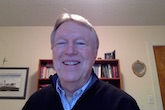Vann S. Joines, Ph.D. is a licensed Clinical Psychologist, licensed Marital and Family Therapist, and President and Director of the Southeast Institute for Group and Family Therapy, Chapel Hill, NC. He is also a Certified Teaching and Supervising Transactional Analyst and the 1994 Winner of the Eric Berne Memorial Award for the Integration of TA with Other Approaches. He is a Diplomate and Founding Member of the Redecision Therapy Association, a Certified Group Psychotherapist, a Certified Practitioner, Teacher and Supervisor in Advanced Integrative Therapy, an Approved Supervisor of the American Association for Marriage and Family Therapy, a Life Fellow of the American Group Psychotherapy Association and the Vice President for Professional Standards of the International Transactional Analysis Association. He is co-author of TA Today: A New Introduction to Transactional Analysis, 2nd Edition (2012) and Personality Adaptations: A New Guide to Human Understanding in Psychotherapy and Counseling (2002) and author of the Joines Personality Adaptation Questionnaire and JPAQ Administrative, Scoring, and Interpretive Kit (2002).
Check out the following Psychology CE Courses based on listening to Shrink Rap Radio interviews:
Jungian Psychotherapy Part 1 (6 CEUs)
Jungian Psychotherapy Part 2 (7 CEUs)
Jungian Psychotherapy Part 3 (7 CEUs)
Jungian Psychotherapy Part 4 (6 CEUs)
Jungian Psychotherapy Part 5 (7 CEUs)
Jungian Psychotherapy Package of the Five Above (33 CEUs)
Wisdom of The Dream (4 CEUs)
Positive Psychology (6 CEUs)
Pros and Cons of Positive Psychology (5 CEUs)
The Fundamentals of Positive Psychology (6 CEUs)
CERTIFICATE PROGRAM IN POSITIVE PSYCHOLOGY (32 CEUs)
Body-Mind: Goodbye to Dualism (6 CEUs)
Brain: Insights from Neuroscience (8 CEUs)
Meditation & Psychotherapy (8 CEUs)
Crisis & Trauma: Identification, Assessment, & Treatment (15 CEUs)
Neuroscience and Healing (8 CEUs)
NEW! Holistic & Nutritional Approaches to Treating Psychological Disorders (5 CEUs)
Get our iPhone/Android app!
Get 10% discount on all lectures at The JungPlatform using our discount code: DRDAVE
You can also earn CEU’s by going to another partner website at Ed4Online!
A psychology podcast by David Van Nuys, Ph.D.
copyright 2014: David Van Nuys, Ph.D.
Podcast: Play in new window | Download
Subscribe: Apple Podcasts | RSS

Great to see TA get a mention.
Still easily the most accessible psychotherapy (with any depth) I think.
I gobbled up everything I could get on Transactional Analysis between 1971 and 1977. It was an excellent “gateway” type of therapy to the human potential world.
The four positions based on combinations of I’m OK you’re OK were not shallow but were the most useful part of the whole theory.
I think the four positions are great shorthand descriptions about real personalities that people are born with.
In Jungian terms I’m OK you’re OK are Intuitives and expresses the openness of creative non-authoritarian types.
I’m not OK you’re OK are the Feeling types. Sensitive to keeping peace at all cost with others.
I’m OK you’re not OK are the go getters. The Sensation types. No one can be trusted to get the job done without pushing and prodding.
I’m not OK you’re not OK is the thinking type. It is the zero point where things will be weighed justly and fairly and constantly re-evaluated.
All types are both useful and subject to social exploitation.
Vann Joines has certainly introduced a kinder and gentler Eric Berne than I remember. I went through TA therapy back when Berne was still alive and though I can understand why a Marrige and Family Therapist is interested in stopping a con and manipulator in a group, there are some serious problems with this approach.First and foremost, Berne was a Freudian trained Psychoanalyst. and was indoctrinated in Oedipal/Drive Theory, that was Freud ‘s ersatz for Original Sin. Berne could find a manipulator in all of his patients. Of course , the worst being the patient who is manipulating his or her narcissistic therapist (and of course that emerges constantly in TA-always blame the victim) . We had a contract that we made in childhood? This is morbid. Berne had a 182 IQ.? On what test was that? What was his EQ.? Like most one size fits all, closed circuit left brained therapy systems, this one is seriously flawed.T A seems as inappropriate today as smoking in the group sessions.
Not Dr Dave’s best interview but nice to hear something from the TA camp – maybe it was Dr Joines preference, but the interview seemed fixed in technical explanations of the basic concepts of TA. I think they are good concepts, but available in hundreds of books and videos – plus they have been expanded and refined enormously since Berne.
I think I missed the usual personal exploration of the experiences and intricacies of the interviewees work.
Here in the UK, TA is held in a fairly good regard among therapists – I certainly haven’t encountered the kind of angry comments above. In fact TA seems to be considered a good basis for developing an integrative practise where a therapist can add techniques that suit their personality and create an authentic personal style. I have found I can use the techniques in my work and have found them helpful in my own therapy. I have also found they work well alongside creative and non-verbal approaches. A look through the list of contributors to the TA journal over the years should demonstrate that there are so many ways to develope Berne’s ideas and that the approach is open to variety, depth and integration. Thanks again for the interview Dr Dave.